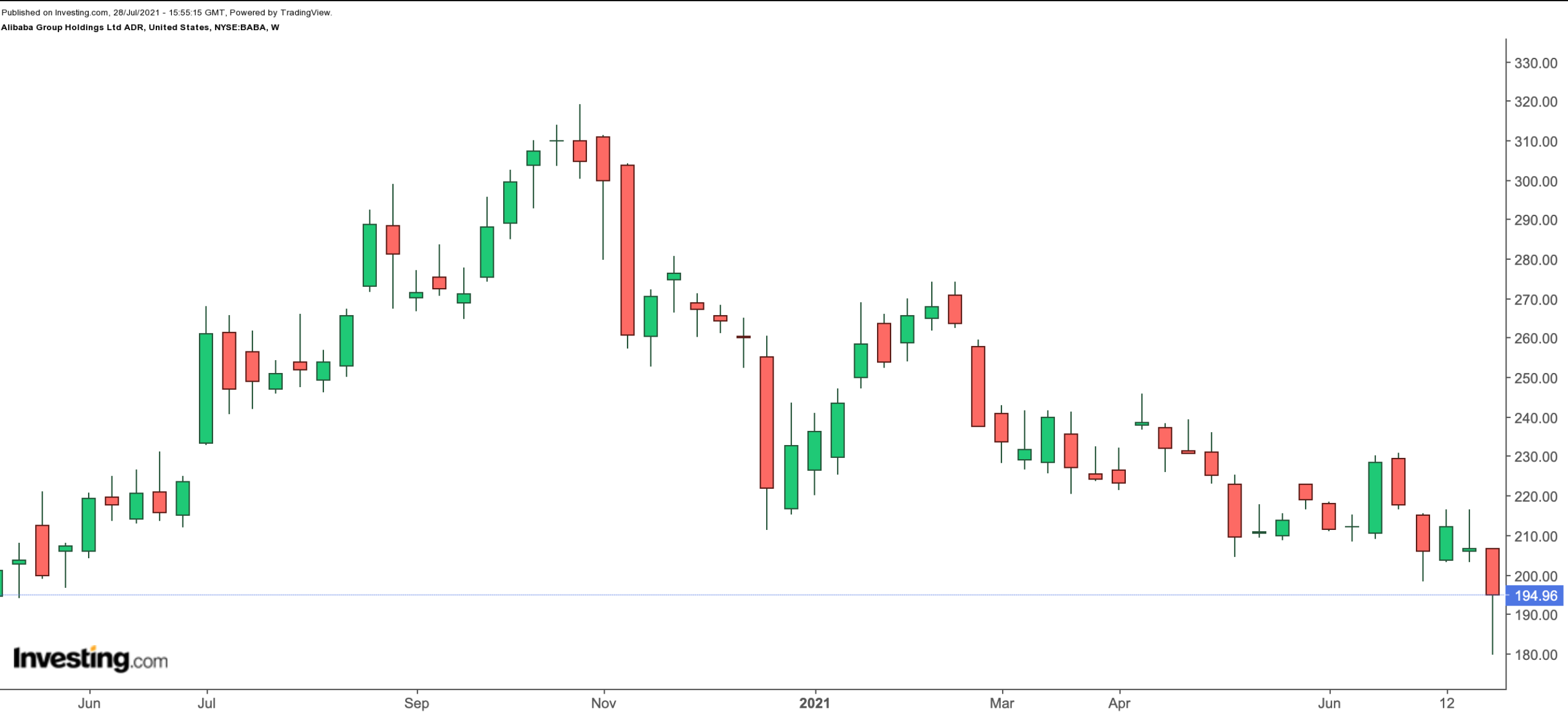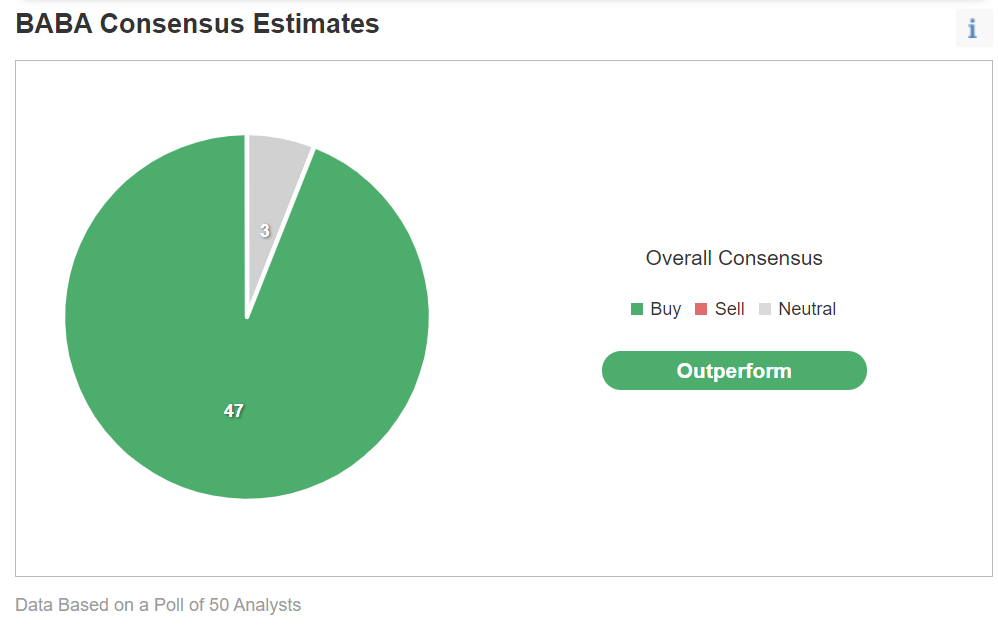Summary
- Alibaba stock, like many other Chinese technology platforms, is under growing regulatory oversight
- Short-term geopolitical headwinds are likely to keep BABA stock in a range between $185-$205 in the near term
- Long-term growth drivers, however, should provide tailwinds for BABA shares
Many Chinese tech stocks, including Alibaba (NYSE:BABA), have not had a good year so far in 2021. BABA shares are down about 16% year-to-date.
In late October 2020, shares of China's internet retail giant saw a record high of $319.32. It has been downhill for the Hangzhou-based company since then, however. In fact, the stock recently saw a 52-week low of $179.67. Now, they are hovering around $195.

Investors in the e-commerce and cloud technology giant are waiting for the company's earnings report to be released on Aug. 3 to get a better understanding of what might be next for BABA shares.
We should note that the recent sell-off has not been limited to Alibaba. Many Chinese tech names, pressured by regulatory crackdowns aimed at businesses in the tech and education sectosr, have also seen rapid declines in 2021. For example:
- Baidu (NASDAQ:BIDU) — down 24% (YTD);
- New Oriental Education & Technology (NYSE:EDU) — down 84% (YTD);
- Pinduoduo (NASDAQ:PDD) — down 53% YTD;
- TAL Education Group (NYSE:TAL) — down 89% YTD;
- Tencent (OTC:TCEHY) — down 16 % YTD.
Current price levels could be tempting for many bullish readers. Alibaba, however, is not likely to start a new leg up in the coming weeks.
Still, there are ways investors might profitably include BABA stock in their portfolios.
Long-Term Tailwinds For Alibaba Stock
Founded in 1999, Alibaba is now regarded as one of the most innovative Chinese technology names. It is the largest e-commerce and technology company in China, but its business lines also include logistics, digital media and entertainment segments, along with various affiliations in the fintech and artificial intelligence space.
On July 27, CEO Daniel Zhang released a Shareholder Letter, which highlighted Alibaba’s growing ecosystem of 1.13 billion customers.
In May, the company announced financial results for the March quarter and FY21. The gross merchandise volume (GMV) came at RMB8,119 billion (US$1,239 billion). Zhang emphasized that in China “the annual average GMV per consumer … exceeded RMB9,200 (US$1,404).”

Chart: Investing.com
Among 50 analysts polled via Investing.com, BABA stock was projected to outperform. With a 12-month median price target of $287.76, that would represent a return of more than 45%.
Over the past several years, investors have been delighted with the growth in Alibaba’s cloud business. In FY21, revenue grew 50% year-over-year to surpass RMB60 billion (US$9.233B).
The stock's trailing P/E, P/S and P/B ratios stand at 22.16, 4.58 and 3.5, respectively. By comparison, Amazon (NASDAQ:AMZN), the most important name in e-commerce as well as cloud technologies, has trailing P/E, P/S and P/B ratios of 69.01, 4.36 and 17.69. So far in 2021, AMZN stock is up 11%.
These metrics highlight the long-term growth potential of BABA stock, which looks cheaper than AMZN on a fundamental basis. Therefore, coupled with the top- and bottom-line growth in the coming quarters, Alibaba would be among the leading shares we would include in a long-term portfolio.
But given the question marks hanging over the extent and duration of regulatory developments in China, as well as other several short-term headwinds, it might possibly be too soon to start a new position in Alibaba shares.
Short-Term Volatility Likely To Continue
Despite the bullish outlook on BABA shares over the long run, there could be several short-term headwinds for the stock, especially between now and the company reports earnings on Aug. 3—and possibly extending into the rest of the summer.
First and foremost are geopolitical developments in China in tandem with the regulatory situation. Alibaba’s founder Jack Ma has in the past been critical of a number of Chinese regulations, especially in the area of financial services.
Many analysts would concur that Ma’s words led to the cancellation of the proposed initial public offering (IPO) of the fintech leader Ant Group, an Alibaba affiliate, in late 2020. Ant Group owns Alipay, the most important digital payment group in the country. Now, it's suggested that Ant Group will become a financial holding company and stay under the scrutiny of the state-controlled Chinese central bank.
Meanwhile, Alibaba has received an 18 billion RMB (or US$2.8 billion) anti-monopoly fine from the State Administration for Market Regulation (SAMR). Recent weeks have seen further regulatory pressure on the “platform economy.”
In the past several days, online education groups, like TAL Education and New Oriental Education & Technology, have also come under review. In other words, as authorities tighten their control of large enterprises in China, it is not quite possible to turn fully bullish on Alibaba or other China-based tech names in the coming weeks.
In addition, investors who watch technical charts might be interested to know that the BABA stock chart does not yet support a long-term bullish move.
Since late June, the shares have lost about 15% of their value, providing a better entry point for buy-and-hold investors. Even so, there could yet be a further pullback toward the $185 level, or even below.
Although the stock is oversold, momentum indicators can stay oversold for a long time. BABA shares might potentially trade sideways in the coming weeks— especially between $185 and $205—until it builds a base around those levels. Only then would a long-term bullish move likely have legs.
As part of the short-term sentiment analysis, it would be important to look at the implied volatility levels for BABA options which typically shows traders the market's opinion of potential moves in a security. However it does not forecast the direction of the move.
BABA’s current implied volatility is 38.1, which is higher than the 20-day moving average of 31.7. In other words, implied volatility is trending higher.
Unknowns from China as well as charts and options markets are urging caution. Given the approaching earnings date, we can expect swings in share price. Our first expectation is for a potential pullback toward $185. In case of such a decline, long-term investors would then find better value.
2 Possible Trades
1. Buy BABA Stock At Current Levels
Investors who are not concerned with daily moves in price and who do not want to wait for a potential decline of about 5%–7% from the current levels, could consider investing in BABA stock now.
On July 28, BABA stock closed at $196.01.
Such buy-and-hold investors should expect to hold this long position for several months while BABA stock potentially makes an attempt at the 52-week high of $319.32
Assuming an investor enters this trade at the current price of $196 and exits around $300, the return would be slightly more than 50%.
Investors might also consider placing a stop loss at about 3–5% below their entry point.
2. Protective Put With An ETF
Readers who are bullish on Alibaba stock but remain nervous about a short-term potential decline might consider buying a protective put in addition to their stock holdings.
Protective puts are usually done with the put option for the stock. However, given the continuing regulatory action in China, we would propose investors buy a protective put on KraneShares CSI China Internet ETF (NYSE:KWEB) as a proxy.
For instance, the trader might buy an at-the-money (ATM) put option, like the KWEB Sept. 17 52-strike put option.
This option is currently offered at $3.60. It would cost the trader $360 to own this put option which expires in less than two months. As a result, Alibaba investors who also hold shares would have some protection, especially during the earnings season, in case the Chinese authorities continue to show their heavy hand on technology stocks.
Bottom Line
Alibaba has become one of the most important e-commerce and tech names, not only in China, but worldwide. Therefore, BABA shares are likely to offer sizeable gains in the years ahead. However, there is probably more volatility ahead before the next bull leg begins.
